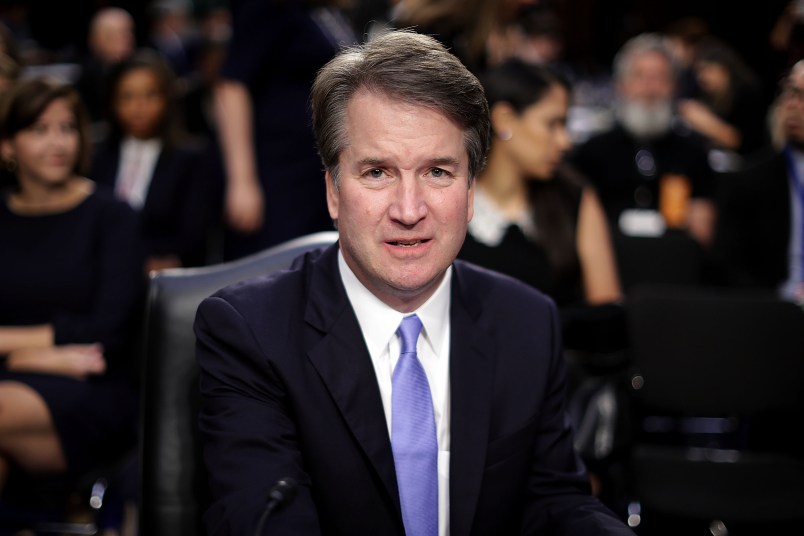The previously-anonymous woman who accused Supreme Court nominee Brett Kavanaugh of sexually assaulting her in high school, per a letter shared with congressional Democrats, came forward publicly Sunday.
“I thought he might inadvertently kill me,” Christine Blasey Ford, now a research psychologist and professor, told the Washington Post in an article published Sunday. “He was trying to attack me and remove my clothing.”
The Post said Ford first contacted the paper in July, when Kavanaugh was on a shortlist of potential Supreme Court nominees. Around the same time, the Post said, Ford sent a letter to her congresswoman, Rep. Anna Eshoo (D-CA), which was then sent to Senate Judiciary Committee Ranking Member Dianne Feinstein (D-CA).
Feinstein made the letter’s existence publicly known this week after news reports revealed some of its contents. More details soon emerged. Ford says Kavanaugh and a friend, laughing “maniacally,” pushed her onto a bed at a party when they were teenagers, after which Kavanaugh jumped on her, groped her and tried to rip off her clothes. When she screamed, Ford recalled, Kavanaugh put his hand over her mouth.
Ford gave the Post therapist’s notes from 2012, when she discussed the alleged assault in couples therapy, the first time she’d done so since high school, she said. Ford said she believed she was 15 at the time of the alleged assault, meaning Kavanaugh would’ve been 17 at the time. She described Kavanaugh and a friend of his, also in the room, as “stumbling drunk.”
The notes don’t name Kavanaugh, the Post said, but describe an assault by students “from an elitist boys’ school,” including one who became a “highly respected and high-ranking members of society in Washington.”
Ford’s husband Russell Ford told the Post he remembered his wife, in 2012, recalling being trapped in a room with two boys, and that one of them “molested her and prevented her from screaming,” in the Post’s words, a description that matches the reported details of the anonymous letter obtained by congressional Democrats.
Russell Ford told the Post he recalled his wife naming Kavanaugh and worrying aloud that he could become a Supreme Court justice one day, the Post said.
A year later, per therapy notes, Ford described a “rape attempt.”
Ford also shared the results of a polygraph test (showing her claim as being truthful) with the Post, which she’d taken on the advice of her lawyer in early August.
“I support Mrs. Ford’s decision to share her story, and now that she has, it is in the hands of the FBI to conduct an investigation,” Feinstein said in a statement Sunday. “This should happen before the Senate moves forward on this nominee.”
Kavanaugh, through the White House, declined to comment, though he’s previously “categorically and unequivocally” denied the allegation. The White House called Ford’s then-anonymous letter an “11th hour delay” attempt by Democrats. Senate Judiciary Committee Chairman Chuck Grassley (R-IA) released a letter signed by 65 women who knew Kavanaugh in high school attesting to his “integrity.” (The Post, without specifying when, said Grassley had received a copy of Ford’s then-anonymous letter from the White House, which had received it from the FBI.)
The second male student in the room besides Kavanaugh, Mark Judge — who allegedly stopped the assault by jumping on top of Kavanaugh and Ford, sending the three of them “toppling,” per the Post, also declined to comment to the Post.
He previously denied the incident having occurred to The New York Times.
Responding to “inaccuracies” about her story being spread publicly, and to her identity slowly becoming known, Ford said: “These are all the ills that I was trying to avoid. Now I feel like my civic responsibility is outweighing my anguish and terror about retaliation.”
“I think it derailed me substantially for four or five years,” she said of the alleged assault.
The Senate Judiciary Committee is scheduled to vote on sending Kavanaugh’s nomination to the entire Senate on Thursday.
Read the Post’s full report here.







“I, David Dennison, can vouch for the good character of Bart O’Kavanaugh. No moral turpitude! Angry Democrats!”
I hope she is a strong person. We have seen this script played out before, and it never goes well for the victim standing in the way of a figure with power and influence (and no conscience).
Yup, she’s about to be run through the wringer for sure.
Yup. GOP playbook. Blame the victim and the messengers:
The GOP knew about this and clearly did nothing in terms is an investigation.